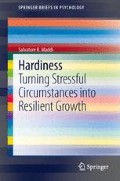Abstract
This chapter concerns how military and safety work roles impose especially stressful circumstances on personnel. These stresses include threats to life, violence requirements, and excessive separation from family life. In these stressful circumstances, hardiness attitudes and strategies have an especially important role in maintaining effective and fulfilling living. Specifically, hardiness helps in finding and fulfilling a bigger picture of life. Also considered is terrorism, which is a new and especially undermining set of stresses that need to be put in perspective and learned from.
Access this chapter
Tax calculation will be finalised at checkout
Purchases are for personal use only
References
Bartone, P. T. (1999). Hardiness protects against war-related stress in army reserve forces. Consulting Psychology Journal, 51, 72–82.
Bartone, P. T., & Snook, S. A. (1999). Cognitive and personality factors predict leader development in U.S. Army cadets. Paper presented at 35th International Applied Military Psychology Symposium, May, Florence, Italy.
Bartone, P. T., Ursano, R. J, Wright, K. M., & Ingraham, L. H. (1989). the impact of a military air disaster on the health of assistance workers: A prospective study. Journal of Nervous and Mental Disease, 177, 317–328.
Florian, V., Milkulincer, M., & Taubman, O. (1995). Does hardiness contribute to mental health during a stressful real life situation? The roles of appraisal and coping. Journal of Personality and Social Psychology, 68, 687–695.
Maddi, S. R. (1999). The personality construct of hardiness, I: Effect on experiencing, coping, and strain. Consulting Psychology Journal, 51, 83–94.
Maddi, S. R. (2002). The story of hardiness: Twenty years of theorizing, research, and practice. Consulting Psychology Journal, 54, 173–185.
Maddi, S. R., Harvey, R. H., Khoshaba, D. M., Lu, J. H., Persico, M., & Brow, M. (2006). The personality construct of hardiness, III: Relationships with repression, innovativeness, authoritarianism, and performance. Journal of Personality, 74, 575–598.
Maddi, S. R., Harvey, R. H., Resurreccion, R., Giatras, C. D., & Raganold, S. (2007). Hardiness as a performance enhancer in firefighters. International Journal of Fire Service Leadership and Management, 1(2), 3–9.
Maddi, S. R., Matthews, M. D., Kelly, D. R.,, Villarreal, B., & White, M. (2011). The role of hardiness and grit in predicting performance and retention in USMA cadets. Military Psychology, submitted.
Westman, M. (1990). The relationship between stress and performance: The moderating effect of hardiness. Human Performance, 3, 141–155.
Author information
Authors and Affiliations
Corresponding author
Rights and permissions
Copyright information
© 2013 The Author(s)
About this chapter
Cite this chapter
Maddi, S. (2013). How Hardiness Facilitates Functioning in Military and Safety Roles. In: Hardiness. SpringerBriefs in Psychology. Springer, Dordrecht. https://doi.org/10.1007/978-94-007-5222-1_8
Download citation
DOI: https://doi.org/10.1007/978-94-007-5222-1_8
Published:
Publisher Name: Springer, Dordrecht
Print ISBN: 978-94-007-5221-4
Online ISBN: 978-94-007-5222-1
eBook Packages: Behavioral ScienceBehavioral Science and Psychology (R0)

